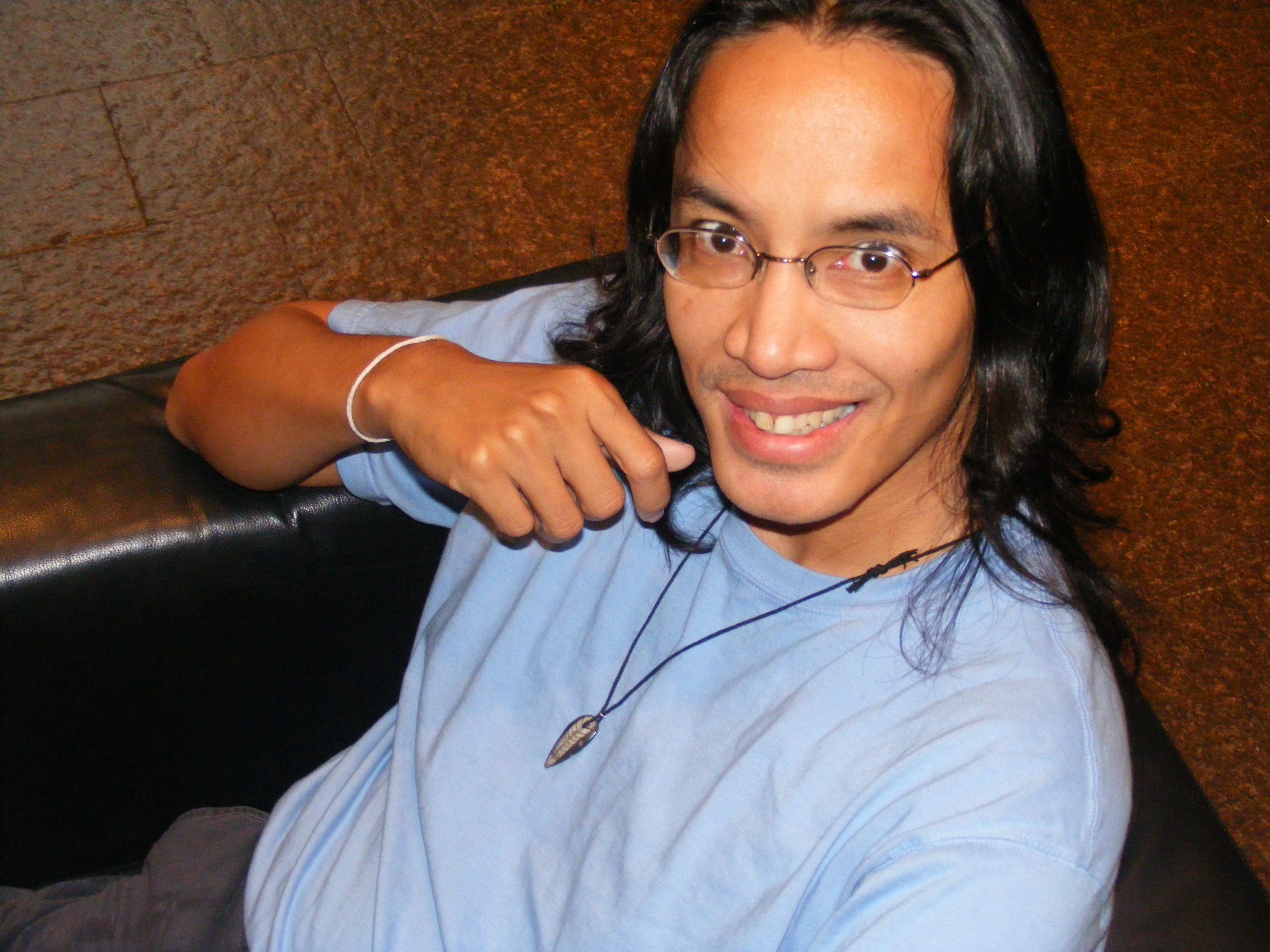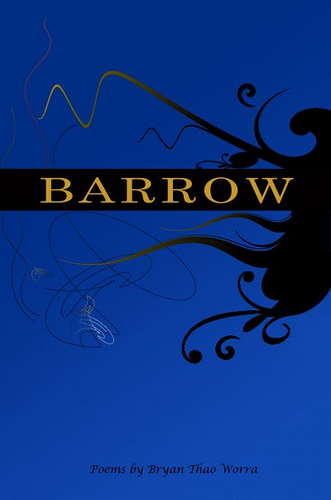Hard Rhymes
Britt Aamodt delves into the story of a recession-era poet and a fateful, life-changing phone call -- she chats with Bryan Thao Worra about poetry, the uncertain terrain of personal history, and the day he heard from the NEA


Determination is a prerequisite for being a poet. Poetry demands the poet dedicate himself, for years and years, to the rigors of line and verse, and to learning the craft when he could be applying his talents to more profitable employments, like structural engineering or respiratory therapy or, let’s admit it, serving drive-thru espresso. Poetry is not a lucrative career in a boom time. So, imagine its pursuit in an economic recession where literary magazines, writer’s conferences, grants, and teaching gigs — mainstays of career poets – are vaporizing like snowflakes in the Gobi Desert. It takes real guts to write in the face of these mounting odds.
Perhaps the lesson is this: the aspiring poet should never give up, but he should also hold on to his day job. That was certainly Minneapolis poet, Bryan Thao Worra‘s two-part credo; at least, it was until 2008, when the recession gobbled up the latter part of the equation. That left him with the first — the “never give up” part — which was cold comfort on a dark afternoon in November 2008 when his courage was plummeting faster than the temperature.
At the time, Thao Worra was jobless, divorced, and nearly penniless. He’d just received a rejection letter from a California literary journal that had asked him to submit poems for publication. The letter informed him that, after due consideration, his poetry just didn’t fit the tone of the magazine. The editors were sorry. And so was Thao Worra.
On the afternoon in question, he was sitting in the dark (to save on the electricity bill) when his cell phone rang. That phone call would change everything (not least his attitude about writing for a living), because the man on the other end of the line said Thao Worra had won $25,000 – for writing poems.
Thao Worra is the award-winning author of several books of poetry including On the Other Side of the Eye, Tanon Sai Jai, Winter Ink, and The Tuk Tuk Diaries: My Dinner With Cluster Bombs. In 2009, he was also one of 42 winners, out of a pool of one thousand applicants, to win a National Endowment for the Arts fellowship.
This October, Thao Worra hit the author circuit to promote his new book of poetry, Barrow (Sam’s Dot Publishing, 2009), which draws from myth, history, science fiction, and pop culture to answer the question: “How does a word obtain multiple meanings?” In essence, it’s a book about uncertainties — the difficulty in pinning down the definitive meaning of any word and, by extension, of even defining one’s self. The poems in Barrow do not answer questions; rather, they open doors of inquiry and leave them hanging.
WHEN GIOIA CALLS, POETS LISTEN
Speaking of uncertainties, back in November 2008, Thao Worra didn’t know if he could make ends meet one more week, let alone one more month. “Unemployment was barely covering expenses,” says Thao Worra, who was thirty-five at the time and old enough to know rock bottom when he hit it. He’d blanketed the town with resumes and had heard nothing. “I was making payments on a gas guzzler. I had rent due in two weeks. I was eating oatmeal with creamer I’d scrounged from the coffee shop, and was really looking forward to a package of ramen noodles I’d saved for later.”
That fateful afternoon, he flipped off the lights, and turned on the record player; a friend had loaned him a Tom Jones LP. He cranked the volume and tried to lose himself in Jones’ “Sex Bomb.” Of course, someone would pick just that moment to call. Thao Worra checked the phone — a long-distance call. On the bright side, the ringing phone meant he had phone service; he still needed to pay the phone bill. “But I was thinking, if this is a telemarketer, I am so going to tell him off,” he remembers.
The caller identified himself as Dana Gioia, (now former) chairman of the National Endowment for the Arts. Thao Worra had applied for an NEA grant a few months before. Given the year he was having, he eyed the kitchen oven with new respect. “I was wondering if this was going to be one of those Sylvia Plath moments: I’m bracing myself, thinking, ‘Wow, great, the National Endowment for the Arts personally calls up people who don’t get the grants. Yeah, just give it to me fast so I can go stick my head in the oven.'”
“I’m calling to congratulate you,” said Gioia.
“Congratulations…why?” said Thao Worra.
“For being selected for an NEA fellowship.”
Thao Worra jumped off the sofa, and spun down the volume on “Sex Bomb;” the oven would have to wait. He listened as Gioia described the fellowship: a panel of judges, other professional poets, had selected Thao Worra as one of the best contemporary poets living in the United States, based on his writing samples and submitted proposal. As a result, he’d receive $25,000 to support his poetry career. “We hope this fellowship comes at a good time for you,” said Gioia.
Thao Worra looked around his Minneapolis apartment. He couldn’t see much beyond the end of his sofa — the lights were still off. He took a deep breath and answered, “Yeah, now’s a pretty good time.”
POEMS FOR PRETTY GIRLS
And Bryan can
barely remember
the beautiful song
of doomed sparrows
outside his chamber
at the Hotel Du Square
after just five minutes!
How can he expect the heavens to remember
these tiny words he insists on writing
for every young girl
who’s afraid of
death?
“Temporary Passages,” Barrow, 2009
“Like most men, I have to admit my first poem was about a girl,” says Thao Worra. He’s let his hair grow long the past year; it falls past his chin. Is it a sign, perhaps, that the hard days are over? That he can let his hair down? The NEA fellowship flowed in at the beginning of 2009. Thao Worra isn’t on easy street, by any means, but he’s moving forward with his poetry books and research. Jobs are opening up — at least he’s out of survival mode, he says. The money has given him the leisure to contemplate how he got to where he is now, and where he wants to go from here.
“People are always telling me, ‘Why don’t you just come right out and say it? Be straightforward with your poetry.’ That’s efficient, sure — but you can talk about ideas in ways that provide greater meaning and are more relevant than if you simply stated them, flat out.”
“There was this girl in school, and I decided to write a poem for her,” he says, recalling the formative moment in high school. Thao Worra grew up in Michigan. “Now that I remember it, I don’t think she ever saw the poem.” He shrugs, “It wouldn’t have impressed her anyway. I have to admit, the poem wasn’t all that romantic — something to do with masks. How do you talk about feelings when you can’t talk about them?”
Even today, two decades on, Thao Worra struggles with an audience that wants him to be more direct. “People are always telling me, ‘Why don’t you just come right out and say it? Be straightforward with your poetry.’ That’s efficient, sure; but you can talk about ideas in ways that provide greater meaning and are more relevant than if you simply stated them, flat out.”
Barrow, Thao Worra’s second full-length collection of poetry, succeeds by indirection. The poet’s slippery touch is evident from the title of the first poem, “Here, the River Haunt,” which, says Thao Worra, “can be read a number of ways. This is the place where people go — a haunt. Or it could be ‘Here, haunt this river,’ an imperative.” Or, it could signify a ghostly haunting.
Thao Worra says he wrote the poem for a student friend at the University of Minnesota. “He was a Hmong artist who committed suicide by jumping off the Washington Avenue bridge, on the U campus. That’s not something everyone will get from the poem, but I don’t think they need to.”
Bodies of students young despair: / An artist, the whispered, teeth and hair.
Barrow is divided into six sections; each consists of poems that treat one of six definitions for the word barrow: a burial mound, a wheelbarrow, a castrated pig, a cloth, a lunar crater, and a sixth, unspecified definition. That last, undefined section is key, because it encapsulates Thao Worra’s approach to life. “Call no man certain until his very last day,” says the poet, paraphrasing the ancient Romans.
Thao Worra’s own history is something of a mystery. Born in 1973, in Laos, he was adopted by an American airline pilot. His adoptive parents told him one version of his birth (the one they were told): that Thao Worra was the son of a deceased soldier in the Royal Lao Army and his widow. Thirty years later, Thao Worra traveled to the region and heard another story: that he was the son of a Buddhist monk, the same Buddhist monk who’d been assigned to be Thao Worra’s guide in Laos.
This story, too, would lose credibility when the poet actually met his birth mother. She’d moved to California not long after the adoption. At their first meeting, she told Thao Worra his birth father was dead; at another meeting, she revised the story. She said his father was alive; he was a farmer living in Laos with his family. She gave her son photos of supposed brothers and sisters.
“The photos had these fake-ass Photoshopped backgrounds. No names. No identifications. I don’t think she did it out of malice,” he explains. “It was like that scene in the movie Blade Runner, ‘Did you get your precious photos?’ Mom thought the photos would give me comfort, or help create this batch of memories [to fill the gap].”
One thing Thao Worra doesn’t talk about in Barrow is his trans-cultural adoptive experience. “I don’t think trans-cultural adoptees can write their history in ink, because that history can be stripped away at any time. It’s happened to me several times,” he says. Even if they’re not explicitly recounted, these experiences inform his work. Poems, like “Hey, Einstein” and “How to Build a Boat,” universalize a fundamental anxiety — not knowing who you really are, or what meaning you should pull from the chaotic swarm of your existence.
His poems also underscore a vein of conscious perseverance, a willingness to push through hardship and uncertainty to the relatively solid footing of self-determination.
True beginnings uncertain, true endings uncertain,
But today will lead to tonight.
For now, that is enough.
“How to Build a Boat,” Barrow, 2009
Thao Worra is using the NEA fellowship to fund the promotion of Barrow and to research a second book of poetry, one that has taken him to Lao and Hmong communities around the United States. Barrow was published October 2009 by Sam’s Dot Publishing in Iowa.
Upcoming readings:
Bryan Thao Worra will read from his new book for the Minnesota Transracial Film Festival at Oak Street Cinema in Minneapolis on November 14 (5:40 pm).
Bryan Thao Worra will speak on November 18 (5 pm) at St. Cloud State University in the Atwood Little Theatre; it’s one of the events of Asian Students in Action’s (A.S.I.A.) annual “Social Justice Week.”